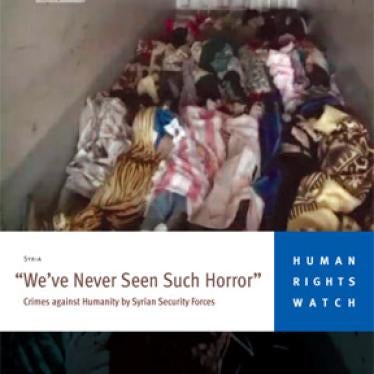We are on a mountain path, crossing from Turkey into northeastern Syria to meet some of the displaced camping near the border fence. The hike over the mountain is beautiful, with pine trees and a shimmering lake in the valley below, but the destination is far from serene. Around 10,000 women, men and children have gathered on the Syrian side of the border within a stone's throw of the fence, while more than 10,000 have already crossed into Turkey and are residing in well-cared-for but off-limits camps.
Syria has made it near impossible to reach people affected by the fierce crackdown, so refugees who flee to neighboring countries or areas not under the control of the Syrian security forces are the only witnesses to human rights violations we can meet with face-to-face. The residents of the makeshift camp are mostly from Jisr Al Shughur and other towns in the northern governorate of Idlib, the majority of whom have escaped since the Syrian army began military operations against their towns on June 10. Syrian officials have justified the attacks as a response to "armed gangs" and "terrorists" who have killed security forces. I am hoping the refugees can shed some light on the events.
We reach the camp shortly after President Bashar al-Assad has concluded his third public speech since protests erupted in mid-March. "Come back, the army will protect you," he tells those who left for the border area and Turkey. But to the refugees huddled around the television, these words ring hollow. "He wants me to go back so they can kill me like they killed my brother," a soft-spoken man in his mid-20s tells me. "I will only go back when Syria is free."
Most of the camp residents have suffered at the hands of Syria's security forces. Many have a brother or a cousin who was killed or detained in the past few weeks. In one tragic example, Bilal al-Masri tells me that security forces killed his father during the early 1980s and his brother three weeks ago. "Killed by the father [Hafez] and the son [Bashar]," he says. "I hope it stops here." Others were injured and escaped for fear that the security forces would harm them if they remained in Syrian hospitals.
Syrians who were active in organizing protests or in filming them are afraid that the security forces will reserve for them the same fate two of their friends met. Anas Katrun and Bashir Abdo were detained on June 10 as they went to film the army's entrance into the towns. They disappeared, only to appear on Syrian state television on June 19 looking haggard and confessing to being "terrorists." Abdo's brother, who is in the camp, can still barely talk about his brother without his voice quivering.
The testimonies we collected from those at the border confirm some of the worrying patterns we documented in other parts of Syria, particularly Daraa, near the southern border with Jordan. Here, as there, security forces have shot at and killed unarmed protesters, arbitrarily detained and tortured people - dozens are still missing - and restricted medical care to many of the wounded. One particularly bloody Friday occurred on May 20 when security forces shot at large protests in the Idlib cities of Maaret Al Numan and Mastoumi, killing at least 40 people and injuring hundreds more - a dozen of whom are in Turkey now.
But the testimonies also show that the Syrian regime's repression is at the same time self-defeating and has the potential to lead Syria into a bloody conflict. On May 13, protesters in Jisr Al Shughur torched the town's Baath party building and someone wrote graffiti, saying, "We burned the building because we are tired of all the lies." The person was referring to the government claim that "armed gangs" and not security forces were responsible for many of the killings. On June 4, after security forces shot at protesters during a peaceful funeral procession in Jisr Al Shughur, young men from the town, as well as some defected soldiers, attacked the security forces, killing security personnel and sustaining heavy losses themselves.
More than 100 days into Syria's protests, it is increasingly clear that the savage and senseless violence of Syria's security forces is fueling the protest movement. While a vast majority of protesters remain committed to peaceful means, some of those interviewed say they are getting tired of being shot at like ducks in a pond and may start adopting more violent means of opposition. Unfortunately, the Syrian government is still not hearing the message. Two days after I left the makeshift border camp, Syrian tanks closed in on it, driving the majority of its temporary inhabitants into Turkey.
Nadim Houry is director of the Beirut office of Human Rights Watch







